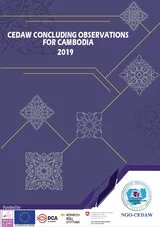CEDAW Concluding Observations for Cambodia 2019 (COB)
CEDAW Concluding observations (CoBs) is one of the key documents created in the CEDAW reporting cycle. The UN Committee on CEDAW (the Committee) normally issues this document after the final in-person review of a state party’s reports to give specific guidance for improving the implementation of CEDAW in the national context. The concluding observations are a very important source of information for work related to the advancement of gender equality.
Since the Royal Government of Cambodia (RGC) ratified CEDAW in 1992, Cambodia has gone through the full review cycle with the Committee three times.
The first CEDAW review of Cambodia was conducted after RGC submitted a combined first, second and third report in 2003. The RGC delegation met with the Committee at the 34th UN CEDAW session on 19 January 2006 in New York, New York, United States, which resulted in the first set of concluding observations (previously called concluding comments) in 2006.
The second review of Cambodia took place at the 56th CEDAW review session on 8 October 2013 in Geneva, Switzerland to respond to a combined fourth and fifth report submitted in 2010, which resulted in the second set of concluding observations in 2013.
The third review responded to a sixth periodic report submitted by RGC in 2018, which the Committee reviewed at the 74th CEDAW review session in Geneva, Switzerland on 29 October 2019. The RGC sent a delegation of 20 representatives organized by the Cambodian National Council on Women to present the report in person and to respond to the Committee’s questions. Meanwhile, 20 civil society representatives from Cambodia (including 16 representatives from 11 organizations representing NGO-CEDAW members and partners) traveled to Geneva to present oral statements and respond to the Committee’s questions. The Committee issued the third set of concluding observations for Cambodia on 12 November 2019. These CoBs commended the RGC for progress made in gender equality, expressed concern for challenges still facing Cambodian women and girls and identified the most urgent and effective measures that needed to be taken to implement the convention in the next four years.
